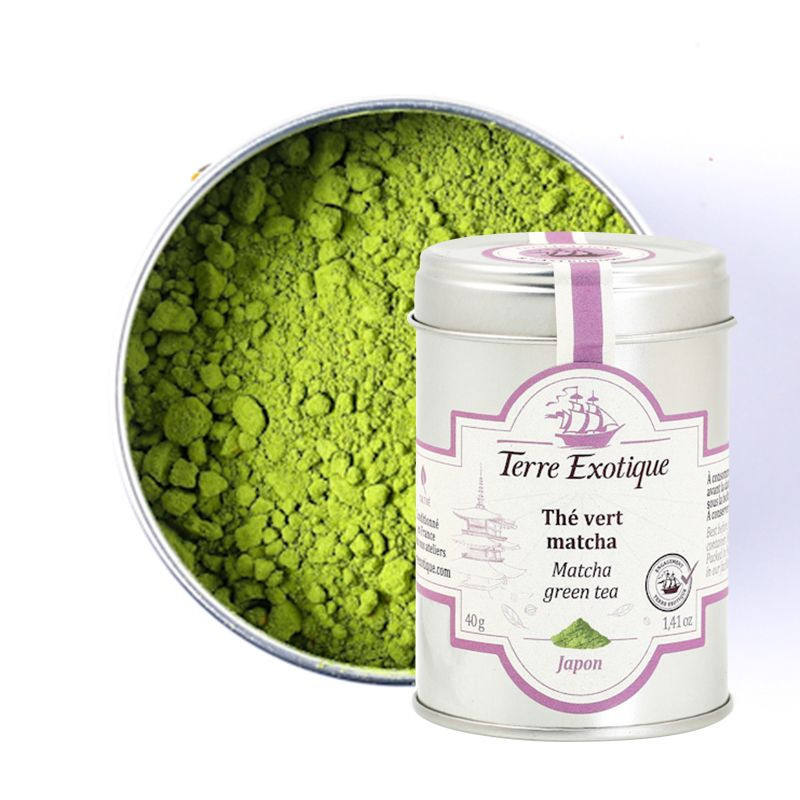



Try the Matcha green tea and enjoy its subtle aroma while baking! This fine powder is obtained through an ancient, refined process that fully brings out the original flavor of matcha green tea. The fine powder combines and spreads well in all kinds of masses, making it perfect for your baked goods, mousses or other treats.
Data sheet
For this green tea, special attention is paid to a careful manufacturing process.
In the center of Japan, in Kyoto Prefecture, lies Uji, a mecca of matcha production. Here grow the tea bushes that produce this delicious green tea. To obtain it in the best quality, a detailed procedure must be strictly followed. A few weeks before harvesting, the tea plants are covered with a black cloth to filter the sun's rays. This means that the tea plants have to struggle to grow. This increases the release of amino acids that sweeten the taste of the tea and give it its beneficial properties. The tea leaves, richly loaded with chlorophyll, are now ready to be picked.
After harvesting, the leaves are steamed for a few seconds. This step prevents oxidation and guarantees the rich green color of the tea. Then the heart of the leaf is separated from the veins, leaving only the soft part, called "tencha". Finally, the tencha is ground very finely. Traditionally, this is done with two stone millstones. The fineness of the powder is comparable to that of talcum powder, which is used in cosmetics or for baby powder.
Chlorophyll and amino acids give the matcha its special taste. The taste is very herbal and for many Europeans at first a little strange. Like a good wine, it takes several tastings to discover all its subtleties. You will notice sweet and herbaceous notes, but no bitterness. Like many other ingredients in Japanese gastronomy, it is close to umami. Matcha tea has an original texture, very round and velvety, which caresses the palate with each sip.
Matcha tea brings sophistication and originality to your pastries! Matcha green tea is widely used in Japanese cuisine, not only for its intense green color, but also for its taste. Use it sparingly, adding 1 to 4 teaspoons of matcha depending on the recipe.
You can use it for ice cream, yogurt cake, coconut panna cotta or to sprinkle a chocolate cake. Its sweetness and delicate flavors go perfectly with many desserts: homemade sorbet, macaroons, tiramisu.... Try it also in a soup, on shrimp or with lean fish with cream sauce. As chocolate lovers, we even recommend mixing the Matcha powder with couverture to pour a Matcha chocolate bar.
To do this, add about half a tablespoon to 100 grams of couverture, mix in and then pour into the mold as usual. We recommend white couverture, because so the Matcha unfolds its color best in a bright green. The powder can also be used for tea, but in this form it is very concentrated and quickly dissolves from the bag.
If you still want to try it, fill a small amount into a fine-mesh bag and pour 70 degree hot water over it. This way, the nutrients and aromas in the matcha tea are not destroyed. After 2-3 minutes you can remove the bag and enjoy the tea. However, due to the powder form, we still recommend to use it only for baking or mixing with other products.
In Japan, tasting matcha tea is considered an art inspired by Zen Buddhism. Each gesture is codified and refers to numerous art forms such as painting, architecture, poetry, ceramics or calligraphy.
This ceremony has remained unchanged for over ten centuries. The Chan Buddhists, for example, are accustomed to drinking it during the sacraments. In Buddhist culture, drinking matcha tea would enable spiritual ascension.
Matcha is known for its antioxidant properties, which can reduce the risk of cancer, but also has many other benefits. It is rich in vitamins A, B, C, E, P, proteins and minerals such as magnesium. Among other things, it is effective against diabetes and hypertension, prevents food poisoning and has an anticoagulant effect that improves the fluidity of the blood.
| Energiewert in kJ | 1355 kJ |
| Energiewert in kcal | 324 kcal |
| Fett | 5.30 g |
| davon gesättigte Fettsäuren | 0.30 g |
| Protein/ Eiweiss | 29.60 g |
| Salz | 0.02 g |
| Kohlenhydrate | 39.50 g |
| davon Zucker | 6.40 g |
Allergen information

Try the Matcha green tea and enjoy its subtle aroma while baking! This fine powder is obtained through an ancient, refined process that fully brings out the original flavor of matcha green tea. The fine powder combines and spreads well in all kinds of masses, making it perfect for your baked goods, mousses or other treats.